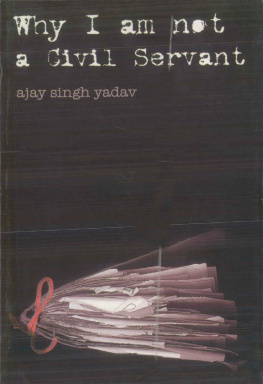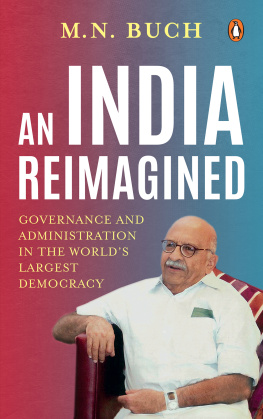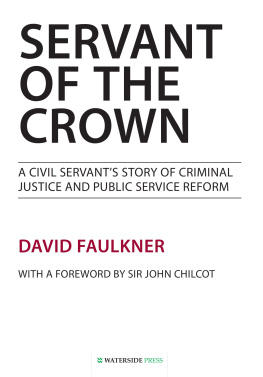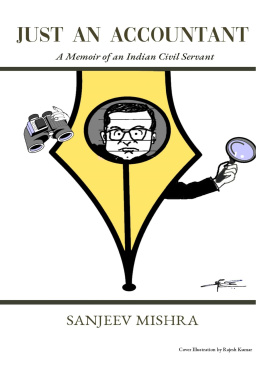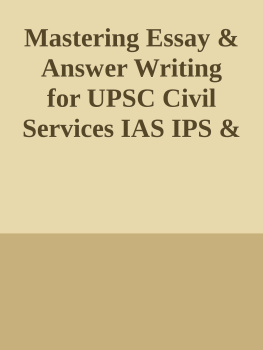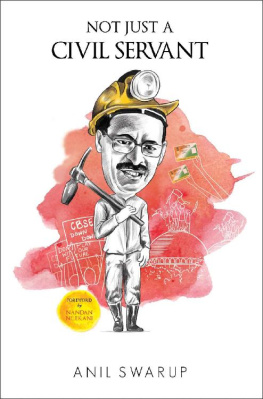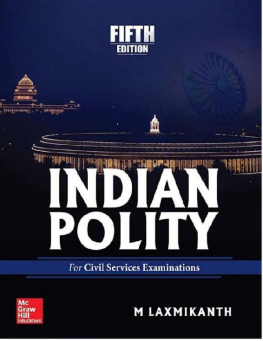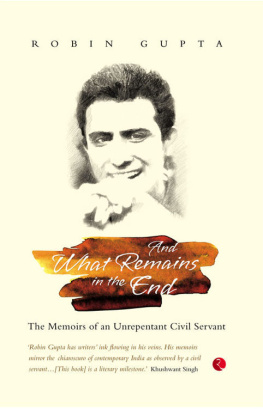Ajay Singh Yadav - Why I am not a Civil Servant
Here you can read online Ajay Singh Yadav - Why I am not a Civil Servant full text of the book (entire story) in english for free. Download pdf and epub, get meaning, cover and reviews about this ebook. year: 2007, publisher: Srishti Publishers, genre: Religion. Description of the work, (preface) as well as reviews are available. Best literature library LitArk.com created for fans of good reading and offers a wide selection of genres:
Romance novel
Science fiction
Adventure
Detective
Science
History
Home and family
Prose
Art
Politics
Computer
Non-fiction
Religion
Business
Children
Humor
Choose a favorite category and find really read worthwhile books. Enjoy immersion in the world of imagination, feel the emotions of the characters or learn something new for yourself, make an fascinating discovery.
- Book:Why I am not a Civil Servant
- Author:
- Publisher:Srishti Publishers
- Genre:
- Year:2007
- Rating:4 / 5
- Favourites:Add to favourites
- Your mark:
- 80
- 1
- 2
- 3
- 4
- 5
Why I am not a Civil Servant: summary, description and annotation
We offer to read an annotation, description, summary or preface (depends on what the author of the book "Why I am not a Civil Servant" wrote himself). If you haven't found the necessary information about the book — write in the comments, we will try to find it.
Why I am not a Civil Servant — read online for free the complete book (whole text) full work
Below is the text of the book, divided by pages. System saving the place of the last page read, allows you to conveniently read the book "Why I am not a Civil Servant" online for free, without having to search again every time where you left off. Put a bookmark, and you can go to the page where you finished reading at any time.
Font size:
Interval:
Bookmark:
Why I Am Not A Civil Servant

BLUEJAY BOOKS
AN IMPRINT OF SRISHTI PUBLISHERS & DISTRIBUTORS
64-A, Adhchini
Sri Aurobindo Marg
New Delhi 110017
Copyright Ajay Singh Yadav 2001
ISBN 81-87075-72-4
Cover Design by Arrt Creations
45 Nehru Apartment, Kalkaji, New Delhi 110 019
e-mail:
All rights reserved. No part of this publication may be reproduced, stored in a retrieval system, or transmitted, in any form or by any means, electronic, mechanical, photocopying, recording, or other wise, without the prior written permission of the Publisher.

Contents

Why I Wrote this Book
I realize that the title of this book may call for some kind of explanation. When Bertrand Russell wrote - Why I am not a Christian, he meant his book to be a systematic refutation of a creed which claimed that it could be proved by unaided reason alone without reference to revealed dogma. I have a similar polemical purpose. My purpose in writing this book is to debunk civil service elitism. Russell was of course a famous philosopher and I am only an unknown citizen, but I do think my two decades long experience of the civil service and the intrinsic importance of the subject gives me a right to divagate into print.
When I announced my decision to leave the civil service my friends and colleagues all had one question for me: "What are you going to do now? How are you going to fill your days?" This was said variously in tones of exasperation, commiseration and incomprehension. So persistent did the questioning grow and so obvious was their bafflement at something which appeared to them to be an act of pure folly that I was forced to tell them finally, "I shall live on until I die." The humour of this remark was not appreciated but I quote this here because the words are not my own but were uttered by a famous statesman in circumstances that deserve to be retold here.
Everyone has heard of Clemenceau, the great French statesman and Prime Minister who led his country to victory in the First World War, after tremendous suffering and sacrifice. Clemenceau was known as 'The Tiger', because of his fierce pride, honesty and intolerance of humbug. After winning the war, Clemenceau retired from public life, to live out his old age in a modest rented apartment. He was offered a state pension and other honours, but true to character, he scorned the trappings of authority as mere baubles, unworthy of a great statesman. He was proud of his poverty and apt to come down heavily on those who came to commiserate with him on this account. When one officious French journalist asked him the same question, "What are you going to do now," he answered testily, "Why, I am going to live on until I die. "
I cite this incident, not because I put myself on the same footing as Clemenceau, but because his perfect contempt for those worldly people who hang on to power like leeches is really splendid. His pride in his status as a free citizen, not dependent on handouts from the state is the very basis of civic virtue so essential in the creation of a civil society. I cannot attempt to disguise from the reader of this truthful chronicle the fact that I feel the same contempt for those of my former colleagues who make this their main objective in life. I think this degrading lust for the plums of office has been the undoing of the civil service. The social consequences of this attitude deserve to be put down in plain words, for it has had a disastrous effect on the quality of governance in this country. In this book I have done so.
The reader will therefore come across many strictures on the civil service in the course of this book and all of them are well deserved and to the point. Indeed, I have if anything been too mild in chronicling this story of decline and decadence. But I do not want to give the impression that the civil service does not have men and women of honour and integrity. It has people of the highest calibre, but my regret is these people are still too small a minority. They do not set the moral tone of the civil service, they are tolerated rather than admired, and they retain their character and values only as a heroic commitment to a personal code of honour, which has neither any official sanction nor any general approbation. Indeed, the clever careerist looks upon these honourable exceptions as irrelevant and out of date fossils. All of which makes me sad. That is why I have written this book. Read on.

Introduction
When I left the Indian Administrative Service in 1998, I still had more than sixteen years of service left before superannuation. I was in fact only slightly past the half way mark in my career. Although I did not possess that mixture of moderate ability and immoderate ambition that leads on to success in the civil service, I was not entirely unsuccessful. I had been Collector for a reasonable length of time, had been head of many departments and when I retired voluntarily from service, was Secretary to Government. My career had therefore followed the usual course, and I could look forward to another two decades, more or less, of time bound promotions, time scale pay rises and comfortable mediocrity, had I stuck it out. After retirement, had I been like the average civil servant, I could have wangled an extension of service, or sought some other sinecure. For your true civil servant never retires, he just becomes a governor, or an ambassador, or chairman of some statutory body, commission, tribunal or committee; if nothing else, he becomes the administrative head of the local chapter of the Boy Scouts or the Red Cross. Life without the trappings of office seems to be inconceivable for all but the few.
I was not, however, like the average officer. I say this in all humility, as a confession rather than a claim. What distinguished me from others was not, however, superior ability. It was rather an inability to obey orders without examining their rationale, to take things on sufferance, to accept conventional wisdom without question. I think if you do not have an instinctive veneration for authority, you are not really cut out to be a civil servant. The civil servant accepts certain loss of personal freedom and independence, in return for a certain measure of authority. Most people in fact do not know what to do with their freedom, all that they crave is authority. They think the exchange well worth their while. I did not think so. I had no regard for authority as such, and I valued my freedom a great deal. This was my problem. Allied to this was a restless intellect, a vein of irreverent humour and a habit of putting across my views in a blunt and unvarnished manner, without the usual circumlocutions and qualifications. As a result of these temperamental angularities, I found myself in almost perpetual revolt against the norms and conventions of the civil service. In every gathering I was the outsider. In every meeting I was the devil's advocate. I felt I was in an organization whose values I did not accept, and which in turn had little use for my peculiar abilities and talents. It was thus a formal acceptance of this natural parting of the ways, which led to my retirement.
Next pageFont size:
Interval:
Bookmark:
Similar books «Why I am not a Civil Servant»
Look at similar books to Why I am not a Civil Servant. We have selected literature similar in name and meaning in the hope of providing readers with more options to find new, interesting, not yet read works.
Discussion, reviews of the book Why I am not a Civil Servant and just readers' own opinions. Leave your comments, write what you think about the work, its meaning or the main characters. Specify what exactly you liked and what you didn't like, and why you think so.

